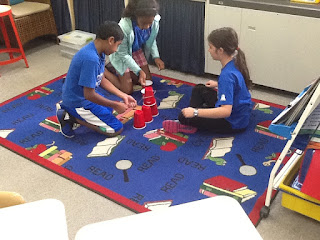This week students are beginning to write their own odes after a week of investigating this genre of poetry. We used a process called immersion which allowed students to read several examples of odes. Students were then asked to identify what they noticed by studying the authors' work. Here is a list of ideas we brainstormed as a class:
What is an Ode?
Students will complete their poems on Wednesday and will begin to publish their work using an app called Pix-n-Tell. Below is a video of how this app works. If possible, students may bring in a device (iPad, cell phone). It would be helpful if students download the app on their device prior to bringing it to school. Devices can be brought to school on Wednesday, December 16th. Please be aware that students have permission to use their device during Project Arrow. Their devices may not be used in the classroom setting unless it is approved by the classroom teacher. I anticipate using the devices on Wednesday and Thursday only. However, I will inform the students if they are to bring in their devices on Friday. Also, the app is free. I did inform students that they can upgrade the app to prevent an unsightly logo from showing up on their finished product. This upgrade is $0.99. Please email or call if you have any questions.
What is an Ode?
- clearly written explanations of topics
- poems which include stanzas
- can be open to interpretation
- written in story-like fashion
- topics can be sentimental-have personal importance or value
- written in first person
- helps audience realize that the topic is a special thing
- there is a grander meaning or purpose (not just an ordinary idea/topic)
- it is a "shout out'-an appreciation of the topic
- can be serious or humorous
- includes figurative language-hyperbole, idioms, similes, metaphors, etc...
- importance is based on author's perspective
- shows or exposes results, impact or effect
Students will complete their poems on Wednesday and will begin to publish their work using an app called Pix-n-Tell. Below is a video of how this app works. If possible, students may bring in a device (iPad, cell phone). It would be helpful if students download the app on their device prior to bringing it to school. Devices can be brought to school on Wednesday, December 16th. Please be aware that students have permission to use their device during Project Arrow. Their devices may not be used in the classroom setting unless it is approved by the classroom teacher. I anticipate using the devices on Wednesday and Thursday only. However, I will inform the students if they are to bring in their devices on Friday. Also, the app is free. I did inform students that they can upgrade the app to prevent an unsightly logo from showing up on their finished product. This upgrade is $0.99. Please email or call if you have any questions.












